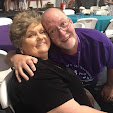(singing) "Do You Hear What I Hear?" I love this Christmas song that talks about the caroling and bells at Christmas time. But that is not the ring that this blog will be about this time.
Nope, I made another boo boo. We were getting ready this morning and I was putting the food in the slow cooker. I took my ring off to wash my hands and when I was done, I washed them one more time before putting my ring back on. I went to slip the ring on my finger and it wouldn't go back on. It made it down to the second knuckle and became stuck on top. Then I realized the problem. Wrong hand. I had put the ring on the right finger, wrong hand.
They say when you marry someone that you become like each other, and I think that is true. (I also think some people who never marry can tend to look like their pet, but that is another story.) Both me and Sheri have smaller fingers on our left hand than the fingers on our right hand. Coincidence? I don't know, but it does seem weird to me to say the least. But I digress.
So we are supposed to be walking out of the house NOW and I'm standing there with a ring that won't go on, won't pull off. I explain to Sheri what I've done and she has me to go get the hand cream from the bedroom. She squeezes a generous blob onto my finger and has me try to remove the ring again. Waa Laah! It worked!
The ring came off and I washed the cream off and then put the ring on the correct hand and finger. That got me to thinking about something. My body wouldn't accept something that wasn't supposed to be there.
Mentally I'm trying to do the same thing. Neither the Hydrocephalus nor the Dementia feel like they are supposed to be there. They feel like foreign bodies fighting for a space in my head and The War Is On!
The loss of short term memory drives me nuts. I can do something one day and by the next I can't even remember doing it. Even if we talk about it each day it doesn't stick with me. I won't remember an event, or if I do, it is after Sheri has reminded me during my round of questions. I watch as she gets frustrated with me. We own a small business downtown and now that I am out on disability, I'll go in on a good day and help out, or at least that is my intention. From what I've read I think I need to do what I can to keep my mind sharp as possible. Most of the time I get things all tangled up and wind up with her basically giving me that look that says "move on or die" and I slink off to the safety of the back room.
I don't want this creature that is trying to take what I have. I didn't ask for it, but it won't leave. I can't find the "lotion" to get it to slide back out. A lot of people tell me that they are surprised with my diagnosis. Truth is I can hold it together for a few minutes when talking to someone, but if it goes over 10 or so, I'm sunk. And it seems like Sheri has to finish my sentences more often now.
That is why I like being able to still type the blog. I can take my time and think about the words and make corrections before I "publish" the blog. I think I do a pretty good job, but if you see mistakes, please just overlook them. I don't want an editor at this time to proofread anything for me. I used to do editing for book/story writers and it can be a challenge sometimes to work with someone else on a project.
I love social media and Facebook has provided some connections that help me to keep abreast of what is happening in the world of research. Seems like there are a lot of companies/people that have good ideas about what to do, but anything that may have a slight promise seems to be more on prevention than a cure. This means I may be stuck with the "ring on the wrong finger" for quite some time.
Let's pray that someone finds that cure and does it quickly. That way someone can hand me the bottle of lotion and this mess can slide off of my body and back into the pits of Hell where it belongs.
Please also take a moment to leave me a comment below and click on the "follow" button that should be located to the right of this blog on your screen. That way you will be notified each time I publish a new blog post..
Until then, remember, #EndAlz #AlzSux #HydroWarrior4Ever




